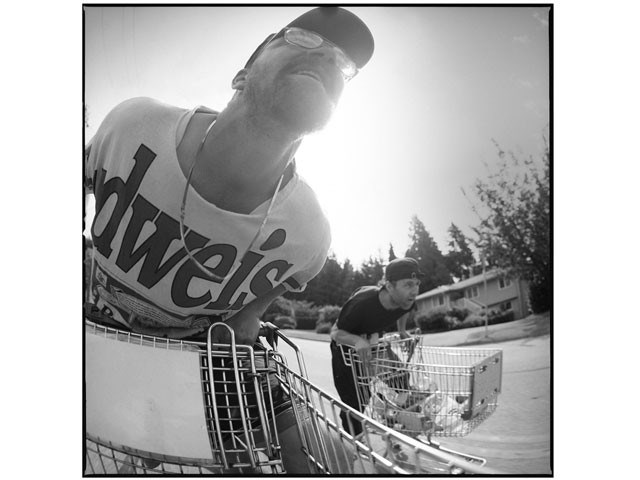“Big Al” careens down the road at speeds of up to 67 km/h, deftly negotiating potholes, cars and other obstacles with his sneakered feet, while drivers stop to honk and cheer him on. But this thrill seeker isn’t on a skateboard or a bike, he’s practicing a unique brand of extreme sport: shopping cart riding.
Big Al is just one of the subjects of Murray Siple’s new film, Carts of Darkness, which explores the culture of bottle picking, homelessness, and disability, with a bit of adrenaline and humour thrown in.
Originally from Kamloops, Siple studied filmmaking at Emily Carr College, and moved to Whistler in 1992 to make full-length snowboard and skateboard films. An avid mountain biker, skateboarder and snowboarder, Siple lived the Whistler lifestyle for four years before he was involved in a serious car accident that broke his neck and left him confined to a wheelchair.
The accident transformed Siple’s life.
“I missed traveling the most — that was the biggest thing for me,” said Siple. “Even in the snowboarding days in Whistler, I rarely was in town for more than a month-long stretch. I was always in another part of the world, wherever there was snow or something, so as soon as I ended up in the hospital, it was like jail.”
It took him almost four years to learn to live life from a wheelchair, and he devoted another few years to building an accessible home in North Vancouver. It would be almost 10 years before he tried his hand at filmmaking again.
“Obviously I wasn’t going to go back to snowboarding and skateboarding movies, because I actually snowboarded and skateboarded myself, so I felt connected to it and wasn’t going to try and pretend I was in touch with the sport from a wheelchair,” Siple said. “…But my training wasn’t making snowboard and skateboard videos, it was any film and video, and I knew that, so I just had to get the strength back to make another type of movie as soon as I could find one, and it turned out to be Carts of Darkness.”
Siple ended up stumbling across the subjects for his film at his local grocery store. They were returning bottles right beside the wheelchair parking spot.
“When I approached them for their permission to interview them, they said that I should be filming them riding these shopping carts. I thought that they were just joking, pulling my leg to see if they could get some beer out of me or something,” said Siple.
They soon proved they meant business, zooming down Mountain Highway with nary an item of protective padding in sight.
Siple started out making a short YouTube video about the cart racers, but the National Film Board got wind of the project and approached him about turning it into a feature length film.
“The film board influenced me to actually put myself in the film, which I had never wanted to do in the first place,” said Siple. “But that really, ultimately is the story, that I’ve always been seeking a thrill, one way or another, and I found it through these guys.”
Siple took on the role of director, enlisting the help of a strong, experienced team to help shoot and edit the film.
To bring in elements from extreme sports films, the crew mounted cameras to carts and helmets to capture the speed and feel of racing, and incorporated a fast-paced soundtrack, with music by Vancouver-based artists Bison, Black Mountain, and Ladyhawk.
But the adrenaline of the cart racing is balanced out by extremely intimate glimpses into the lives and characters within the community.
The film explores the lives of three North Vancouver bottle pickers: Big Al, a 32-year-old who began riding shopping carts to get back and forth from school; Bob, a poet, musician and painter; and Fergie an alcoholic with a disability that prevents him from working or riding carts.
“It was quite depressing at times, working with these people,” said Siple. “I followed them for three and a half years and they weren’t going to get out of their situations, no matter what.”
During the production of the film, four people Siple and his crew documented died from alcoholism.
“That didn’t happen in snowboarding so much, in fact, I barely even filmed someone getting an injury,” Siple added.
But Siple is quick to point out that not all of the subjects in the film have substance abuse problems or are homeless. And he said he hopes Carts of Darkness will help challenge preconceptions.
“People know so much about the downtown east side they just assume, if they see a shopping cart on the North Shore, they’re drug addicts, too,” he said. “…Same with the wheelchair. I know people, when they see me for the first time when I go on a trip… someone will think that I’ve been in a wheelchair for life. They have no idea that I was a snowboard filmmaker, that I still have talents that I use, and that I’ve accomplished quite a lot, maybe more than some people that are able-bodied.”
So far, the film has been a glowing success. It’s been accepted into the Toronto Hot Docs Festival, the Vancouver International Film Centre, purchased by the Sundance Channel, and has been requested by a few other film festivals, as well. And Siple said he’s heard some promising feedback from people who have seen the film.
“I’ve heard comments… that it’s woken people up a little bit to try and take their own risks, and do more with their own life, because they see people that are in compromised positions doing more with their lives,” said Siple.




